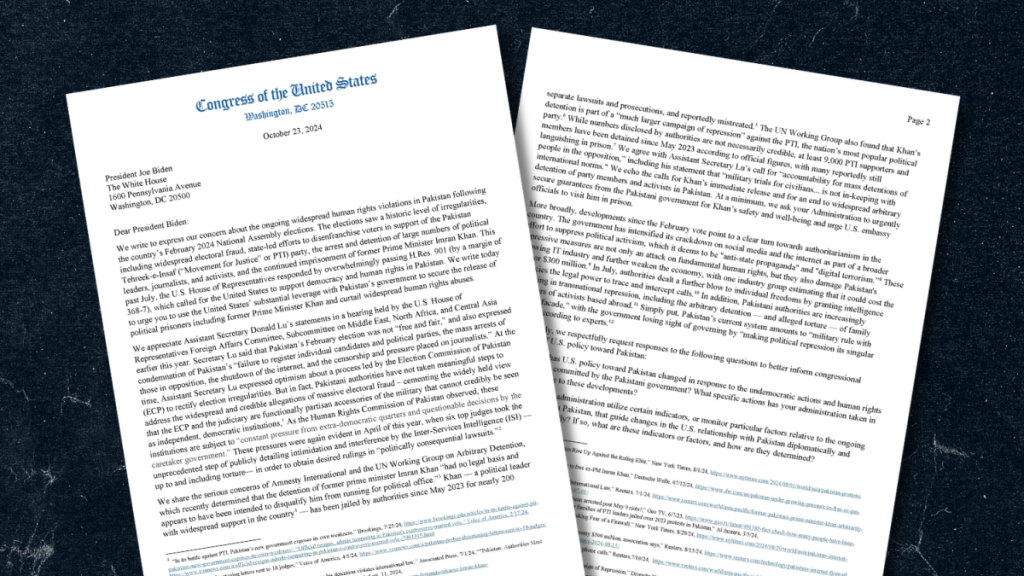Recently, Tehreek-e-Insaf has touted a letter signed by 60 members of the U.S. Congress urging the U.S. government to advocate for Imran Khan’s release and consider sanctions on Pakistan’s military. PTI has framed this letter as evidence of international backing for Khan’s cause. However, an in-depth examination of its signatories reveals troubling biases, suggesting that PTI’s foreign support might be driven by anti-Pakistan interests rather than genuine democratic ideals.
The signatories of the letter include a range of figures known for their critical views on Pakistan. For instance, Frank Pallone, one of the prominent supporters, has a long-standing record of opposing Pakistan’s nuclear policies, denouncing its blasphemy laws, and advocating a stronger U.S.-India alliance.
Similarly, Ted W. Lieu, another backer of the letter, has repeatedly expressed skepticism over arms sales to Pakistan and questioned its democratic processes, while maintaining close alignment with Israel. Other supporters, such as Joaquin Castro and Lloyd Doggett, have been open about their sympathy for India’s stance on Kashmir, often presenting critiques of Pakistan that undermine its regional influence.
A deeper look into the letter’s backers unveils another noteworthy trend: several prominent Jewish members of Congress with strong pro-Israel leanings. Representatives like Brad Sherman, Jan Schakowsky, Debbie Wasserman Schultz, and Steve Cohen have, in addition to their support for Israel, raised concerns over Pakistan’s policies, often advocating for reforms that challenge Pakistan’s sovereignty.
Jewish members such as Jamie Raskin, Ted Deutch, Alan Lowenthal, and David Cicilline share similar views, favoring policies that align with Israel’s stance while scrutinizing Pakistan’s regional role, especially in Kashmir and Afghanistan. This pattern reveals a coordinated agenda where, under the guise of advocating for democracy, these individuals may be aiming to destabilize Pakistan’s internal structures.
Furthermore, 50 of the letter’s supporters are known LGBTQ advocates, whose social views starkly contrast with Pakistan’s traditional values. Many of these members, including Jim McGovern, Dina Titus, Greg Casar, and Marc Veasey, have close ties with India, frequently endorsing India’s stance in regional conflicts while criticizing Pakistan’s policies on human rights and governance.
This collective push to interfere in Pakistan’s political affairs raises questions about whether this letter genuinely supports democratic reform or serves foreign ideological and political goals.
In the context of PTI’s strategy, this letter appears less about democratic support and more a vehicle for anti-Pakistan sentiment. By aligning with foreign figures who consistently oppose Pakistan’s interests, PTI risks empowering voices that may use Khan’s case to influence Pakistan’s policies in favor of external agendas.
The backing PTI receives from these Congress members reflects a concerning alignment that could prioritize foreign interests over Pakistan’s long-term stability and sovereignty. This letter underscores the growing danger of allowing foreign interference in Pakistan’s internal matters, especially when it is masked as support for democracy.


